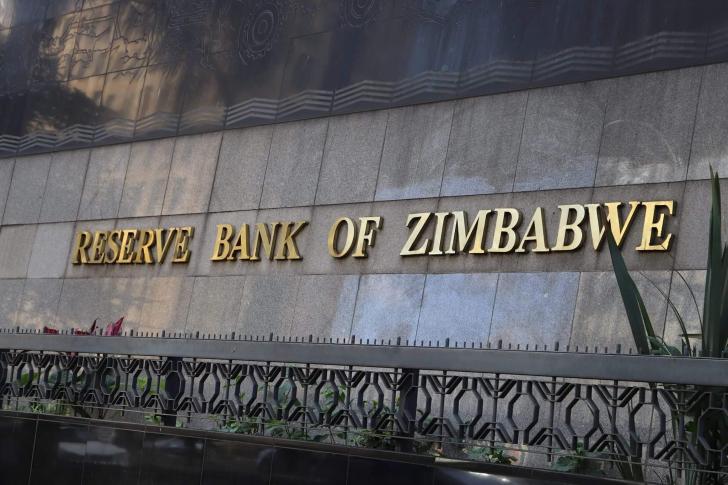News / Local
Top Bank executive slams RBZ tight policy measures
10 Nov 2024 at 11:05hrs |
0 Views

A prominent banking executive has criticized the Reserve Bank of Zimbabwe (RBZ) for focusing too heavily on exchange rate stability at the cost of economic growth, warning that the central bank's recent monetary policy measures could have long-term negative consequences for the country's financial sector.
In September 2024, the RBZ devalued the Zimbabwean Gold (ZWG) currency, reducing its premium from ZWG13.80 to around ZWG25.28. This move aimed to improve the currency's acceptability and close the gap between the official and parallel market exchange rates, which were hovering around ZWG35. Additionally, the RBZ raised the statutory reserve requirements for both local and foreign currency savings and time deposits from 5% to 15% to curb inflation and stabilize the economy.
The Zimbabwe Gold (ZWG) strengthened by 2.4% to 27.9986 per dollar, marking its first increase since October 17. Authorities have attributed this to the tight stance of the Monetary Policy Statement (MPS). However, a top executive from a major bank in Bulawayo, speaking anonymously, slammed the RBZ's approach as "counterproductive."
"The entire focus of the RBZ is on exchange rate stability, but the fact of the matter is that we are currently struggling to service our clients on a daily basis," the executive said. "The hiking of statutory reserves means we now have to increase our deposits with the central bank, which effectively takes away what we have in stock and leaves us with very little to work with."
The banker further expressed frustration over the RBZ's recent announcement that local companies could not fully utilize the US$25 million available on the interbank market. "Where does the Central Bank expect us to get the money from? They've decided to take more of our money through statutory reserves, and then ask us to take up the US$25 million on offer, which is simply impossible," the banker argued.
The executive emphasized that the RBZ's policy stance is limiting the ability of financial institutions to lend meaningfully to the productive sector. He warned that this could have far-reaching consequences, stifling business growth and innovation, and pushing the economy into a more precarious situation.
"Monetary authorities need to weigh the repercussions of such tight monetary policies," he said. "Yes, we are safeguarding exchange rate stability, but is it all we want as an economy? We need policies that balance exchange rate stability with growth, job creation, and investment."
The banking sector has long been critical of policies that restrict access to credit and capital, and this latest round of RBZ measures is seen as a further blow to an already fragile economy. With inflation still high and disposable incomes shrinking, many businesses and financial institutions are struggling to navigate the complex regulatory environment and the mounting financial pressures.
While the RBZ maintains that these measures are necessary to control inflation and stabilize the currency, critics argue that the economic benefits may be short-lived if the central bank continues to neglect the broader needs of the economy, especially in terms of supporting business development and investment.
In September 2024, the RBZ devalued the Zimbabwean Gold (ZWG) currency, reducing its premium from ZWG13.80 to around ZWG25.28. This move aimed to improve the currency's acceptability and close the gap between the official and parallel market exchange rates, which were hovering around ZWG35. Additionally, the RBZ raised the statutory reserve requirements for both local and foreign currency savings and time deposits from 5% to 15% to curb inflation and stabilize the economy.
The Zimbabwe Gold (ZWG) strengthened by 2.4% to 27.9986 per dollar, marking its first increase since October 17. Authorities have attributed this to the tight stance of the Monetary Policy Statement (MPS). However, a top executive from a major bank in Bulawayo, speaking anonymously, slammed the RBZ's approach as "counterproductive."
"The entire focus of the RBZ is on exchange rate stability, but the fact of the matter is that we are currently struggling to service our clients on a daily basis," the executive said. "The hiking of statutory reserves means we now have to increase our deposits with the central bank, which effectively takes away what we have in stock and leaves us with very little to work with."
The banker further expressed frustration over the RBZ's recent announcement that local companies could not fully utilize the US$25 million available on the interbank market. "Where does the Central Bank expect us to get the money from? They've decided to take more of our money through statutory reserves, and then ask us to take up the US$25 million on offer, which is simply impossible," the banker argued.
The executive emphasized that the RBZ's policy stance is limiting the ability of financial institutions to lend meaningfully to the productive sector. He warned that this could have far-reaching consequences, stifling business growth and innovation, and pushing the economy into a more precarious situation.
"Monetary authorities need to weigh the repercussions of such tight monetary policies," he said. "Yes, we are safeguarding exchange rate stability, but is it all we want as an economy? We need policies that balance exchange rate stability with growth, job creation, and investment."
The banking sector has long been critical of policies that restrict access to credit and capital, and this latest round of RBZ measures is seen as a further blow to an already fragile economy. With inflation still high and disposable incomes shrinking, many businesses and financial institutions are struggling to navigate the complex regulatory environment and the mounting financial pressures.
While the RBZ maintains that these measures are necessary to control inflation and stabilize the currency, critics argue that the economic benefits may be short-lived if the central bank continues to neglect the broader needs of the economy, especially in terms of supporting business development and investment.
Source - NewZimbabwe
Join the discussion
Loading comments…































